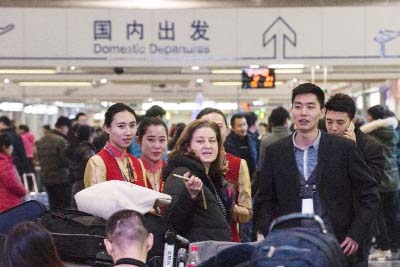
AFP, Parish :
A French reporter forced to leave Beijing after she criticised government policy in violence-racked Xinjiang arrived home Friday after warning of dark days ahead for journalists working in China.
Beijing accused Ursula Gauthier, the China correspondent for France’s L’Obs news magazine, of supporting terrorism after she wrote an article questioning official comparisons between global Islamist violence and unrest in the homeland of the mainly Muslim Uighur ethnic minority.
It then refused to renew her credentials, obliging her to leave on December 31 when her visa expired.
Speaking from her Beijing home before departing, Gauthier said the future looked bleak for journalists in China.
“What happened with this small article about Xinjiang could happen with anything else,” she said. “This could be really dangerous in the future.”
France and Europe should be “concerned about what is going on here, not because it is a journalist, not only because of the freedom of press, but also because it is about China and what China is doing to its minorities, and even its majority, the problem is the same,” she added.
After landing in France, Gauthier vowed to continue writing about China and condemned Beijing over her effective expulsion.
“This has been a month and a half of madness,” she told AFP at Charles de Gaulle airport in Paris.
“We must not expel a journalist who was just doing her job, who just wrote an article, who knows the situation,” she said.
In her story for L’Obs, Gauthier questioned China’s motives in expressing sympathy for the victims of the November 13 Paris attacks, writing that they were calculated to tie Beijing’s harsh policies in Xinjiang into the fight against global terrorism.
The veteran reporter, who has spent six years in China, suggested that violence by Uighurs against civilians in the region — where clashes have killed hundreds in recent years — was in part driven by resentment of government policies.
Meanwhile, the religious atmosphere in China’s violence-prone far western region of Xinjiang became markedly less radical last year and the government was broadly successful in maintaining stability, the top official there was quoted as saying on Friday.
Hundreds of people have been killed over the past few years in resource-rich Xinjiang, strategically located on the borders of central Asia, in violence between the Muslim Uighur people who call the region home and ethnic majority Han Chinese.
A French reporter forced to leave Beijing after she criticised government policy in violence-racked Xinjiang arrived home Friday after warning of dark days ahead for journalists working in China.
Beijing accused Ursula Gauthier, the China correspondent for France’s L’Obs news magazine, of supporting terrorism after she wrote an article questioning official comparisons between global Islamist violence and unrest in the homeland of the mainly Muslim Uighur ethnic minority.
It then refused to renew her credentials, obliging her to leave on December 31 when her visa expired.
Speaking from her Beijing home before departing, Gauthier said the future looked bleak for journalists in China.
“What happened with this small article about Xinjiang could happen with anything else,” she said. “This could be really dangerous in the future.”
France and Europe should be “concerned about what is going on here, not because it is a journalist, not only because of the freedom of press, but also because it is about China and what China is doing to its minorities, and even its majority, the problem is the same,” she added.
After landing in France, Gauthier vowed to continue writing about China and condemned Beijing over her effective expulsion.
“This has been a month and a half of madness,” she told AFP at Charles de Gaulle airport in Paris.
“We must not expel a journalist who was just doing her job, who just wrote an article, who knows the situation,” she said.
In her story for L’Obs, Gauthier questioned China’s motives in expressing sympathy for the victims of the November 13 Paris attacks, writing that they were calculated to tie Beijing’s harsh policies in Xinjiang into the fight against global terrorism.
The veteran reporter, who has spent six years in China, suggested that violence by Uighurs against civilians in the region — where clashes have killed hundreds in recent years — was in part driven by resentment of government policies.
Meanwhile, the religious atmosphere in China’s violence-prone far western region of Xinjiang became markedly less radical last year and the government was broadly successful in maintaining stability, the top official there was quoted as saying on Friday.
Hundreds of people have been killed over the past few years in resource-rich Xinjiang, strategically located on the borders of central Asia, in violence between the Muslim Uighur people who call the region home and ethnic majority Han Chinese.

